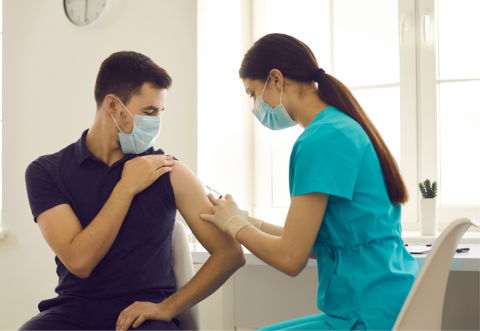
Vaccinations will once again be available to people at highest risk of mpox (formerly known as monkeypox) following a small increase in the number of cases in Greater Manchester. Vaccination has played a crucial role in protecting people and reducing the number of people infected. Case numbers have remained low since December 2022.
People who are eligible for a mpox vaccine include:
- men who are gay, bisexual or have sex with other men, and who have multiple partners, participate in group sex, or attend sex-on-premises venues (staff at these venues are also eligible)
- people who've been in close contact with someone who has mpox – ideally, they should have one dose of the vaccine within 4 days of contact, but it can be given up to 14 days after
- healthcare workers caring for patients with confirmed or suspected mpox
Two doses are recommended for longer-term protection against mpox, with the second dose given at least 28 days after the first.
People can find their nearest vaccination clinic through the NHS website: Find an mpox vaccination site - NHS (www.nhs.uk). Clinics may be held on different days of the week to support patient choice and to maintain existing sexual health services. If a date and time is not shown, people should call the number listed online to find out more information.
Locala will be running mpox vaccination clinics on Thursday 12th October in Tameside and on Thursday 19th October in Stockport. The Northern, Contraception & HIV Service will be running a weekly mpox vaccine at the Hathersage Centre, details can be found on their dedicated service page.
Dr Helen Wall, GP, and clinical director of population health for Greater Manchester for NHS Greater Manchester Integrated Care said:
“Following a small cluster of mpox cases in Greater Manchester, we have extended our vaccination programme to ensure people considered at high risk of getting mpox can protect themselves and others from severe illness.
“Although cases remain low, it’s important to react quickly so we don’t see a rise in cases. We are working with sexual health clinics across Greater Manchester to offer people a further chance to get protected if they did not get a vaccination last year.
“We would urge people not to worry as cases remain low across the country. We are working with partners, including with sexual health charities to ensure information on signs and symptoms, staying safe and protecting yourself and others is shared.”
What are the signs and symptoms of mpox?
Anyone can get mpox, though most cases have been in men who are gay, bisexual or men who have sex with other men. The risk of getting mpox remains low for most people. While the infection is mild for many, it can cause severe symptoms for others. If you're infected with mpox, symptoms usually start five to 21 days later. The symptoms often get better by themselves over two to four weeks.
Symptoms can include:
- unusual rashes or lesions (blisters) on the body including mouth, genitals, and anus (these may start after other symptoms),
- flu-like symptoms including muscle and back aches, shivering (chills) and tiredness,
- a high temperature, sometimes called a fever,
- swollen glands in the neck, armpits, or groin and
- proctitis (anal or rectal pain).
Sometimes, people may confuse the rash for chickenpox. The rash has spots/ blisters which fill with fluid, then scab over and fall off. You can pass mpox on while you have symptoms.
What to do if you have symptoms of mpox?
In the first instance, contact your local sexual health clinic if:
- you have a new unexplained rash or lesion on your body, especially the face or genitals.
- you have been in contact with someone who has had mpox in the last three weeks.
Mpox is usually diagnosed by taking a swab taken from one or more mpox blisters or ulcers. Do not attend a clinic, hospital, or your GP in person, unless they arrange an appointment. Tell the person you speak to if you've had close contact with someone who has or might have mpox. Stay at home and avoid close contact with other people, including sharing towels or bedding, until you've been told what to do. People who cannot contact a sexual health clinic or GP should call 111. If you are concerned about a child, please contact your GP.
Dr Chris Ward, consultant in sexual health and HIV, Manchester University NHS Foundation Trust said:
“While cases remain low, we are keen to encourage people to come forward for a vaccination, first or second dose, if they have not already had one. Two doses provide the best protection to help keep you and others safe.
“As with any vaccine, it won’t give 100% protection, and won’t be effective straight away. Until you receive your second dose, and even after being vaccinated, continue to look out for mpox symptoms to reduce your risk of infection.
“Mpox hasn’t gone away. Anyone who spots anything unusual – symptoms that are flu like, feel unwell and have lesions – even a single lesion – should ring NHS 111 or their sexual health clinic. Remember, that there are lots of other reasons that people may have rashes and spots, so please be supportive of others and kind. Together, we can help reduce stigma.”
Most people who have mpox recover well at home. Some people might need treatment in hospital; though the number of people needing inpatient treatment is lower after vaccination, and lower than during last year’s surge.
If you need help to find a sexual health clinic, use the NHS website or contact the Pash Partnership for support.
More information about mpox can be found on the NHS website and the LGBT Foundation website, by searching for mpox.